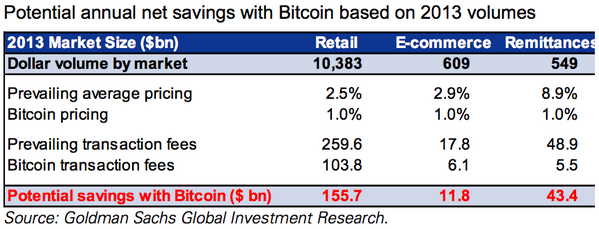Is Visa Purchase Insurance for Bitcoin?
Goldman Sachs estimates that Bitcoin could bring potential savings of $167.5BN per year in regular transactions, ignoring the much higher savings in remittances.
Where did it get that number? And how will payment firms - Visa, MasterCard, AmEx - respond?
GS's number is straightforward. Look at the following graph:
If retail and ecommerce together are just under $11TN in 2013, typical processing fees are 2.5%-2.9%, and typical Bitcoin processing fees are 1.0%, then expected savings are 1.5%-1.9% of transactions, or a total of $167.5BN.
How will the payment firms respond? They will probably go down 3 tracks:
- Restrictive: For many years, Visa, MC, AmEx, and the others, prohibited a business from charging a purchaser more for using a credit card than cash or check. Even though it cost the merchant 2.5-3% more to process the credit card, they were not allowed to recoup it. The merchant could swallow the costs; raise all prices (which most did, when they could); or simply not take the credit card, not a real option in today's world. Many locales, including most US states, now allow merchants to offer a discount for paying in cash, as long as it is clearly indicated. Of course, cash itself has costs - higher insurance, needing to take cash to the bank, potential losses - so the net savings on cash aren't really the entire processing fees of 2.5-3%, but something less than that amount.
- Protective: The hold processors have over merchants is, of course, consumers. Credit cards are not only a significant convenience to consumers; they provide protection. If you are overcharged, or need extra insurance on a car rental, or didn't receive what you deserved, the card companies will, in many cases, go to bat for you.
- Financial: Eventually, if they can, and BTC grows large enough, they will lower those transaction fees to make them more appealing to merchants. Of course, those are very big "ifs". Many large companies are simply structurally unable to change their revenue model, or culturally unable to accept that they need to.
Eventually, the restrictive covenants will wither away in the face of competition and regulation. 40 out of 50 US states explicitly allow your local gas station or dry cleaner to give you a lower price for an alternate form of payment, and consumers will demand more both from their regulators and their merchants.
On the financial side, some will succeed in lowering fees, while others will try to go upmarket, charging higher fees for better benefits and cachet.
However, a big thrust will be marketing. Payment processors will attempt to convince consumers that credit cards offer them protection that Bitcoin - and cash - does not. Will that work? That depends not on economics but on marketing.
There is a term for a business that, in exchange for a small percentage of expected total value or cost will protect you in case of infrequent but high damages related to that value or cost: insurance.
The Protective element is nothing more or less than an insurance policy: "pay us (through the premium we collect via the merchant) around 2-3% of your purchase, and we will give you insurance on some potential damages to that purchase."
Is that necessary? And is it the most efficient way to provide that insurance?
I suspect that it may be emotionally necessary for many consumers, but that it is not the most efficient way. Actually, if a company were to step into the breach and offer "Purchase Insurance for Bitcoin Transactions", exactly as the credit card companies do now, and throw in some miles benefits to boot, for, say, 0.5-1% of transactions, they might push the insurance, I mean payment processing, companies off the pedestals. If I were CEO of Visa or MasterCard, that piece is the one that would unnerve me.
